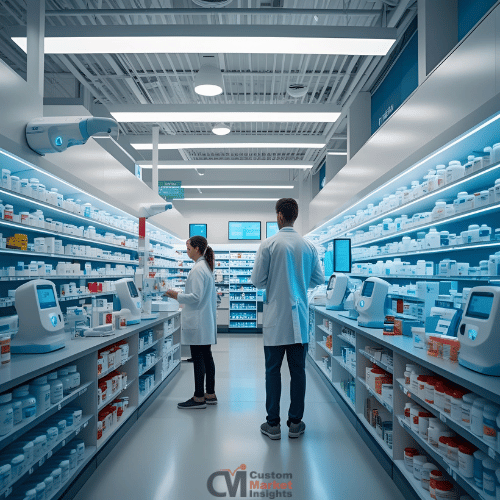The drug industry is on the brink of a huge technological leap forward in digital technology. Companies are using artificial intelligence to change drug discovery, production, and delivery. The need for research and development is increasing, the necessity for novel ideas is increasing, and the need for personalized service is increasing. AI speeds up all elements of the pharmaceutical value stream, such as looking for compounds, running clinical trials, and overseeing the supply chain.
CMI estimates that the AI in the Pharmaceuticals Market will rise by 40% CAGR by 2030.
This implies that the industry will have to act and compete in new ways in the future. It’s not a question of whether AI will become important in drug production, but when businesses can resume using and enhancing their digital talents. We’ve gone from years to months to find novel medications. It might take a lot of time and money to locate medications the easy way. The whole process of creating and launching a novel medicine has always taken more than a decade and billions of dollars.
AI has shortened that time. Special software tools may now predict how molecules will interact, simulate how compounds will function, and choose which agents have the greatest possibilities. The information is assembled from a large group of genomic data, disease biomarkers, and chemical libraries.
For instance, Insilico Medicine and Benevolent AI employ deep learning techniques to identify innovative therapeutic approaches and develop novel compounds from their inception. These teams may create a drug in as little as a few years with the aid of AI, instead of the usual several months.
AI is revolutionizing clinical trial design and execution, a historically desperate and high-risk phase.
With the aid of predictive analytics, pharma businesses can recognize optimal patient populations, forecast dropout rates, and assess adherence and efficiency in real-time. NLP is also used to mine clinical notes and earlier trial data for useful information, which is then used to make better decisions throughout trial planning. Some AI models go so far as to anticipate the probability that the use of a particular trial design, drug, and patient demographics will be successful in a clinical trial.
According to CMI, the prevalence of AI-powered clinical trial use will decrease expansion timelines by 30-50% in the forthcoming five years.
One of the most encouraging areas where AI can change the pharmaceutical and biotech business is personalized or precision medicine. By combining genetics, lifestyle, and patient medical history, AI systems help you develop therapy strategies ideal for the person. This strategy yields superior patient results, fewer adverse effects, and better adherence rates. Pharmaceutical firms are now forging strategic co-operations with tech businesses and healthcare providers to create AI programs that can forecast a patient’s reaction to a prescription before it is even accessible to the general public. AI is significantly reshaping how medicines are generated and administered by the public.
Compliance and Safety: How AI Works
The pharmaceutical industry is one of the most regulated, with the quality of the data, safety reporting, and documentation being held to the highest standards. AI is helping companies do more with this complex regulatory environment quickly and efficiently.
Among other things, AI-powered tools can:
- Monitor adverse events based on real-world data
- Automate pharmacovigilance checks
- Guarantee accurate documentation for audits and submissions
- Analyze literature and global regulatory databases for ongoing compliance
All these factors not only cut down the approval timeline but also increase transparency and trust between companies, regulators, patients, and other stakeholders.
Challenges:
Not All Pills Are Worth the Swallow: The integration of AI into pharma comes with several challenges. As the data is highly sensitive, privacy is essential. The question of bias is also open: as informational systems make life-changing decisions, it is key that they are fair and explainable. Additionally, the current regulatory frameworks are lagging behind. Companies need to ensure they are compliant and their tools are well-validated. And last but not least, the organizational culture should shift as well; traditional scientists shall be willing to collaborate with new, data-oriented colleagues.
The Road Ahead: Close Human-Machine Collaboration. The future of the pharmaceutical industry depends on a profound human-machine collaboration. The industry is not about replacing researchers with robots; it’s about empowering them to make better, faster, and more personal decisions.
CMI’s to the report states that “AI is no longer a tool for faster drug development but is soon becoming for the modern pharmaceutical strategy. Those who fail to adopt it risk lagging behind in the ever-evolving pharma.”
Conclusion: AI-Powered Pharma Will Be Defining Health of Tomorrow
AI has revolutionized the pharmaceutical industry by revolutionizing the discovery of molecular activity and spreading optimization across global pharmaceutical chains. The application of artificial intelligence in pharmaceuticals has become a lifesaver by making healthcare more accessible and offering treatment that is cheaper to develop.
However, with the pharma industry under increased pressure driven by global population growth and exerting pressure to make judicious developments responsible, AI offers a scientifically viable but sustainable option. Scientists may predict tomorrow’s drug rather than discover it in a laboratory.
Connect with our Experts

